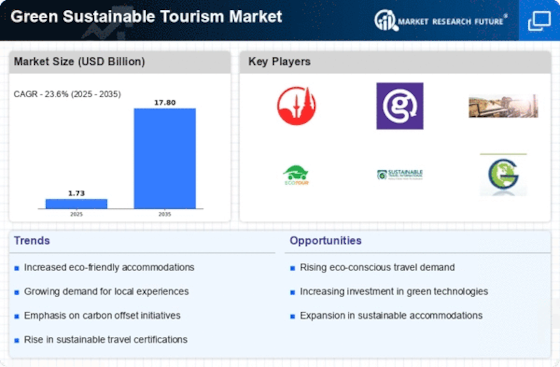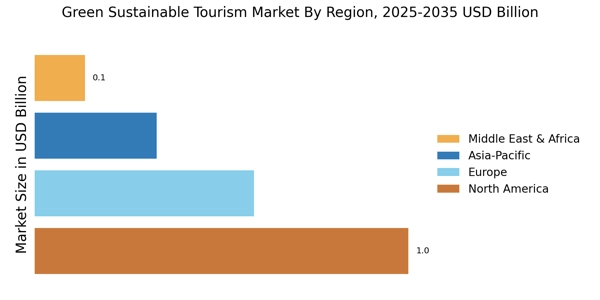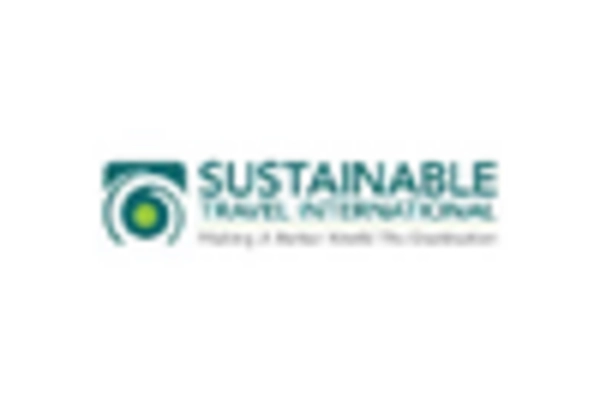Rise of Eco-Conscious Travelers
The increasing awareness of environmental issues among travelers appears to be a primary driver for the Green Sustainable Tourism Market. As consumers become more eco-conscious, they actively seek travel options that align with their values. This trend is reflected in a survey indicating that over 70% of travelers prefer sustainable accommodations and activities. The demand for eco-friendly practices is not merely a passing trend; it suggests a fundamental shift in consumer behavior. This shift is likely to influence the types of services and products offered within the Green Sustainable Tourism Market, as businesses adapt to meet the expectations of this growing demographic.
Increased Focus on Climate Change
The heightened awareness of climate change is significantly influencing the Green Sustainable Tourism Market. As climate-related events become more frequent, travelers are increasingly concerned about their carbon footprints and the environmental impact of their travel choices. This awareness is prompting a shift towards more sustainable travel options, such as carbon offset programs and eco-friendly accommodations. Research indicates that a substantial portion of travelers is willing to pay more for sustainable options, reflecting a commitment to environmental responsibility. Consequently, businesses within the Green Sustainable Tourism Market are likely to prioritize sustainability initiatives to meet this growing demand, thereby fostering a more environmentally conscious tourism landscape.
Government Regulations and Incentives
Government policies and regulations are emerging as a significant driver for the Green Sustainable Tourism Market. Many countries are implementing stricter environmental regulations aimed at reducing the tourism sector's ecological impact. Incentives such as tax breaks for sustainable practices and funding for eco-friendly projects are encouraging businesses to adopt greener methods. For example, some regions have introduced certification programs that recognize sustainable tourism operators, thereby enhancing their marketability. These regulatory frameworks not only promote sustainability but also create a competitive advantage for businesses that comply. As governments continue to prioritize environmental sustainability, the Green Sustainable Tourism Market is likely to experience accelerated growth.
Consumer Demand for Authentic Experiences
There is a growing consumer demand for authentic and immersive travel experiences, which is driving the Green Sustainable Tourism Market. Travelers are increasingly seeking connections with local cultures and environments, favoring experiences that are both enriching and sustainable. This trend is reflected in the rise of community-based tourism initiatives, which allow travelers to engage with local communities while supporting their economies. Such experiences often emphasize environmental stewardship and cultural preservation, aligning with the values of eco-conscious travelers. As this demand for authenticity continues to rise, the Green Sustainable Tourism Market is expected to adapt, offering more tailored experiences that resonate with these evolving consumer preferences.
Technological Integration in Sustainable Practices
Technological advancements are playing a crucial role in enhancing sustainability within the Green Sustainable Tourism Market. Innovations such as smart energy management systems and eco-friendly transportation options are becoming increasingly prevalent. For instance, the adoption of renewable energy sources in hotels and resorts has been shown to reduce carbon footprints significantly. Moreover, data analytics is being utilized to optimize resource management, thereby minimizing waste. This integration of technology not only improves operational efficiency but also appeals to environmentally conscious consumers. As technology continues to evolve, its impact on the Green Sustainable Tourism Market is expected to grow, potentially leading to more innovative solutions for sustainable travel.

















